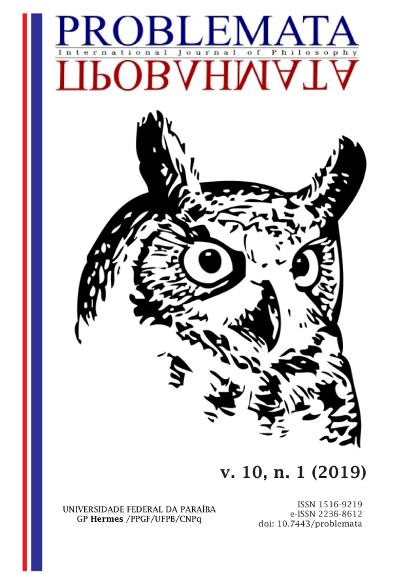CULTURE OF DIALETTS AND AESTHETIC EXPERIENCE: THE SOCIETY OF MASS MEDIA, IN GIANNI VATTIMO
DOI:
https://doi.org/10.7443/problemata.v10i1.41265Keywords:
Postmodernity. Mass Media. Dialect Culture. Aesthetic Experience.Abstract
The present study deals with a discussion about the investigation of Gianni Vattimo's philosophical reflection on "post-modernity". Through the thinking of this Italian philosopher, it is pointed out, from his arguments about the postmodern, to the need to reflect on the current conditions in relation to culture and the new way of understanding the world for contemporary society, because, according to Vattimo, one should think of it as a whole, as something that is not limited to partial readings of its context. To this end, we use Vattimo's interpretations of the philosophers' thinking, such as Friedrich Nietzsche and Martin Heidegger, in which we find the necessary bases for a crucial understanding of our time and, consequently, the unfolding of his philosophical thoughts on the subject . Thus, it is proposed a reflection on the new experiences coming from postmodernity, notably on the performance of the mass media in this society, seeking to elucidate the new cultural configuration present in the so-called postmodern society and, consequently, the mass action media in this globalized society, mainly through the reading of The Transparent Society, aiming at its proposal of emancipation of thought, in view of being possible to present the culture of the dialects and the artistic experience present in this cultural context, as being characteristic of what will be called a media society.Downloads
References
ADORNO, Theodor W.. Dialética do esclarecimento: fragmentos filosóficos. Tradução Guido Antônio de Almeida. Rio de Janeiro: Jorge Zahar Editora, 1985.
ALMEIDA, Rogério M.. A fragmentação da cultura e o fim do sujeito. São Paulo: Edições Loyola, 2012.
ANDERSON, Perry. As origens da pós-modernidade. Tradução Marcus Penchel. Rio de Janeiro: Zahar Editores, 1999.
BENJAMIN, Walter. Magia e técnica, arte e política: ensaios sobre literatura e história da cultura. Tradução Sérgio Paulo Rouanet. 7. ed. São Paulo: Brasiliense, 1994.
BODEI, Remo. A Filosofia do século XX. Tradução Modesto Florenzano. São Paulo: EDUSC, 2000.
CHAUI, Marilena. Simulacro e poder: uma análise da mídia. São Paulo: Editora Fundação Perseu Abramo, 2006.
HEIDEGGER, Martin. O Fim da Filosofia e a Tarefa do Pensamento. Conferências e Escritos Filosóficos. São Paulo: Nova Cultural, 1996.
LYOTARD, Jean-François. A condição pós-moderna. Tradução por Ricardo Corrêa Barbosa. José Olympio, 2008.
NIETZSCHE, Friedrich. II Consideração Intempestiva sobre a utilidade e os inconvenientes da Historia para a vida. In: ______. Escritos sobre História. São Paulo: Loyola, 2005.
SILVA, Reginaldo O.. O Pós-moderno explicado às diferenças: a sociedade dos mass media em Gianni Vattimo. Argumentos – Revista de Filosofia. Ano 3, Nº. 6, p. 149-160, 2011.
TEIXEIRA, Evilázio B.. Aventura Pós-moderna e sua sombra. São Paulo: Paulus, 2005.
VATTIMO, Gianni. O fim da modernidade: hermenêutica e niilismo na cultura pós-moderna. Tradução Eduardo Brandão. São Paulo: Martins Fontes, 1996.
VATTIMO, Gianni. Sociedade transparente. Tradução Hossein Shooja e Isabel Santos. Lisboa: Relógio D’Água Editores, 1992.
VATTIMO, Gianni; ROVATTI, A.P. Il Pensiero Debole. Milano: Feltrinelli Editore, 1983.
VATTIMO, Gianni. As Aventuras da Diferença: o que significa pensar depois de Heidegger e Nietzsche [1980]. Lisboa: Edições 70, 1988.
VATTIMO, Gianni. A filosofia e o declínio do Ocidente. Revista FAMECOS, [S.l.], v. 1, n. 10, abr. 2008. ISSN 1980-3729. Disponível em: <http://revistaseletronicas.pucrs.br/ojs/index. php/revistafamecos/article/view/3027>. Acesso em: 05 Mar. 2016.
Downloads
Published
Issue
Section
License
Authors who publish with this journal agree to the following terms:
- Authors retain copyright and grant the journal right of first publication with the work simultaneously licensed under a Creative Commons Attribution License that allows others to share the work with an acknowledgement of the work's authorship and initial publication in this journal.
- Authors are able to enter into separate, additional contractual arrangements for the non-exclusive distribution of the journal's published version of the work (e.g., post it to an institutional repository or publish it in a book), with an acknowledgement of its initial publication in this journal.
-
- Authors are permitted and encouraged to post their work online (e.g., in institutional repositories or on their website) prior to and during the submission process, as it can lead to productive exchanges, as well as earlier and greater citation of published work (See The Effect of Open Access).





